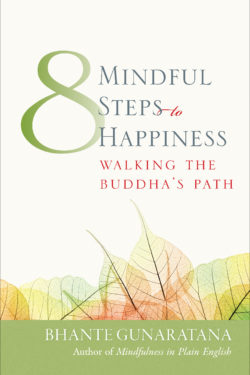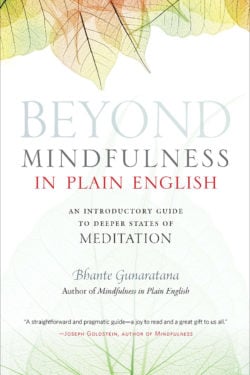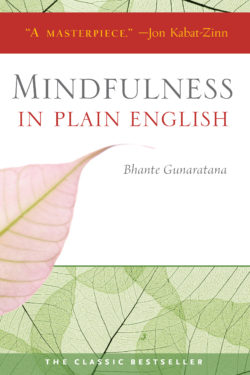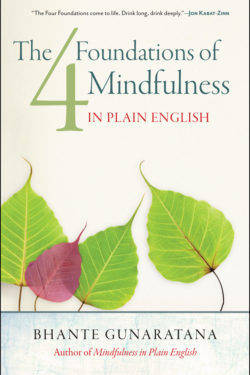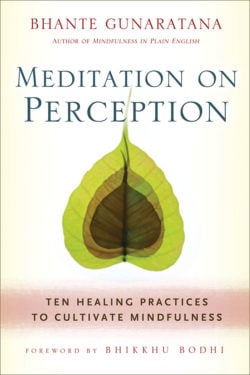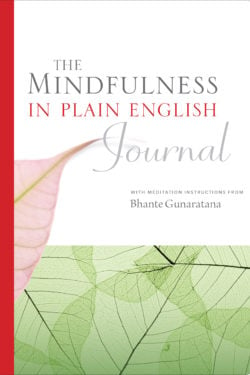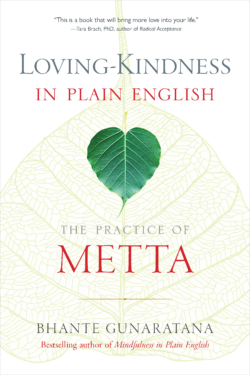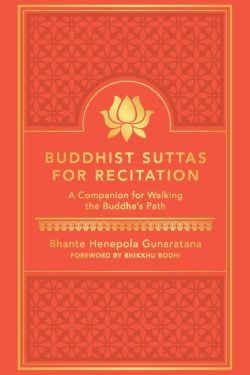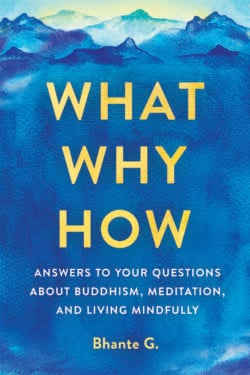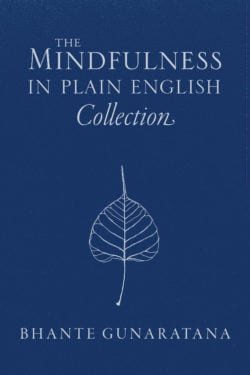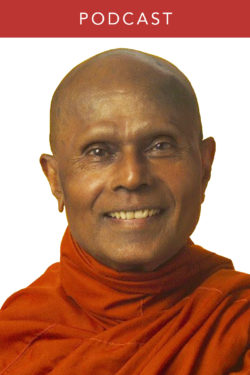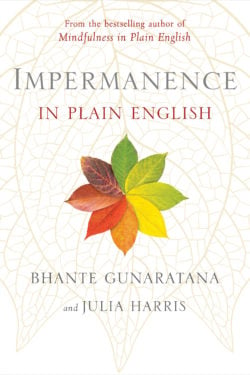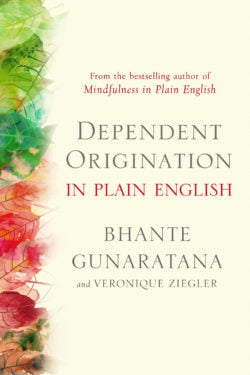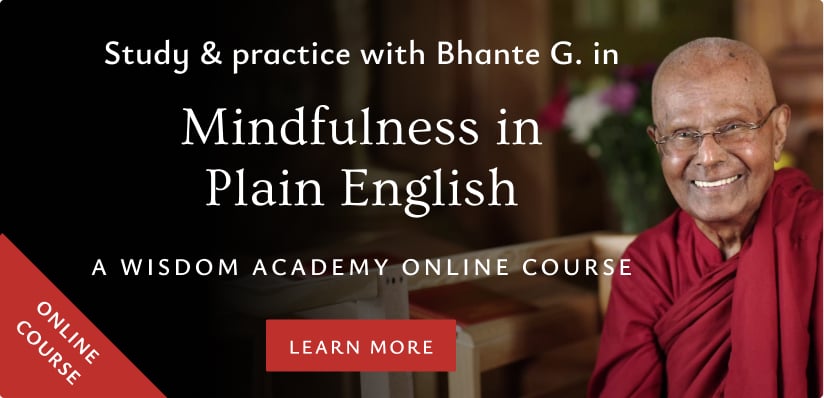Bhante Gunaratana

Bhante Gunaratana was ordained at the age of twelve as a Buddhist monk in Sri Lanka, earned his PhD in philosophy from The American University, and has led meditation retreats, taught Buddhism, and lectured widely throughout the United States, Canada, Europe, and Australia. Bhante Henepola Gunaratana is the president of the Bhavana Society in High View, West Virginia, where he lives.
Books, Courses & Podcasts
Eight Mindful Steps to Happiness
In the same engaging style that has endeared him to readers of Mindfulness In Plain English, Bhante Gunaratana delves deeply into each step of the Buddha’s most profound teaching on bringing an end to suffering: the noble eightfold path. With generous and specific advice, Eight Mindful Steps to Happiness offers skillful ways to handle anger, to find right livelihood, and to cultivate loving-friendliness in relationships with parents, children, and partners, as well as tools to overcome all the mental hindrances that prevent happiness. Whether you are an experienced meditator or someone who’s only just beginning, this gentle and down-to-earth guide will help you bring the heart of the Buddha’s teachings into every aspect of your life.
A Foreword Magazine Book of the Year Awards finalist (Spirituality/Inspirational).
Beyond Mindfulness in Plain English
Countless people worldwide have made Mindfulness in Plain English a beloved and bestselling classic in almost a dozen languages. Now after nearly two decades, Bhante helps meditators of every stripe take their mindfulness practice to the next level—helping them go, in a word, beyond mindfulness. In the same warm, clear, and friendly voice, Bhante introduces the reader to what have been known for centuries as the “jhanas”—deeply calm, joyous, and powerful states of meditation that, when explored with the clearly presented tools in this book, can lead to a life of insight and unshakeable peace.
Mindfulness in Plain English
“A masterpiece.”
—Jon Kabat-Zinn
Since Mindfulness in Plain English was first published in 1994, it has become one of the bestselling — and most influential — books in the field of mindfulness. It’s easy to see why.
Author Bhante Gunaratana, a renowned meditation master, takes us step by step through the myths, realities, and benefits of meditation and the practice of mindfulness. The book showcases Bhante G’s trademark clarity and wit, as he explores the tool of meditation, what it does, and how to make it work.
This expanded edition includes the complete text of its predecessor along with a new chapter on cultivating loving kindness, an especially important topic in today’s world. For anyone who is new to meditation, this is a great resource for learning how to live a more productive and peaceful life.
The Four Foundations of Mindfulness in Plain English
In simple and straightforward language, Bhante Gunaratana shares the Buddha’s teachings on mindfulness and how we can use these principles to improve our daily lives, deepen our mindfulness, and move closer to our spiritual goals.
Based on the classic Satipatthana Sutta, one of the most succinct yet rich explanations of meditation, Bhante’s presentation is nonetheless thoroughly modern. The Satipatthana Sutta has become the basis of all mindfulness meditation, and Bhante unveils it to the reader in his trademark “plain English” style.
Contemplating the Four Foundations of Mindfulness—mindfulness of the body, of feelings, of the mind, and of phenomena themselves—is recommended for all practitioners. Newcomers will find The Four Foundations of Mindfulness in Plain English lays a strong groundwork for mindfulness practice and gives them all they need to get started right away, and old hands will find rich subtleties and insights to help consolidate and clarify what they may have begun to see for themselves. People at every state of the spiritual path will benefit from reading this book.
Meditation on Perception
Use the unique Buddhist practice of meditation on perception, as taught by the best-selling author of Mindfulness in Plain English, to learn how shifting your perspective can transform mental and physical health.
Perception—one of the basic constituents of the body and mind—can be both a source of suffering and pain, as well as a source of happiness and health. The Buddhist tradition teaches that perception can be trained and ultimately purified through the practice of meditation. When we understand how perception impacts our lives, we can use it, just as we do any other object of meditation, to overcome harmful ways of thinking and acting and to develop healthy states of mind instead. In Meditation on Perception Bhante G brings us, for the first time in English, an illuminating introduction to the unique Buddhist practice of meditation on perception as taught in the popular Girimananda Sutta.
The ten healing practices that comprise meditation on perception make up a comprehensive system of meditation, combining aspects of both tranquility and insight meditation. Tranquility meditation is used to calm and center the mind, and insight meditation is used to understand more clearly how we ordinarily perceive ourselves and the world around us. Alternating between these two practices, meditators cultivate purified perception as explained by the Buddha. As a result of these efforts, we progress on the path that leads to freedom, once and for all, from illness, confusion, and other forms of physical and mental suffering.
Meditation on Perception gives us the keys to move beyond ordinary, superficial perception into an enlightened perspective, freed from confusion and unhappiness.
The Mindfulness in Plain English Journal
“People ask me how to practice mindfulness in daily life—this journal answers that question.”
—Bhante Gunaratana
Discover the transformative power of mindfulness—in your own words. Based on the classic bestseller Mindfulness in Plain English, Bhante Gunaratana offers compassionate guidance and the space to explore meditation in your own life.
Explore your insights and keep track of your emotional life without judgment, and begin to change the stories you tell about yourself. Includes a brief introduction to meditation so anyone can get started right away, as well as mindfulness tips and inspiring quotes.
Loving-Kindness in Plain English
With his signature clarity and warmth, Bhante Gunaratana shares with us how we can cultivate loving-kindness to live a life of joyful harmony with others. Through personal anecdotes, step-by-step meditations, conversational renderings of the Buddha’s words in the suttas, and transformative insights into how we live in and relate to the world, we learn that peace here and now is possible—within ourselves and in all our relationships. Bhante G speaks directly to how we can cultivate loving-kindness to find emotional clarity, overcome anger, and become more peaceful—both on and off the meditation cushion.
Loving-Kindness in Plain English was chosen for the Spirituality & Practice Book Award as one of the 50 Best Spiritual Books of 2017 by the website Spirituality & Practice.
Start Here, Start Now
A master of mindfulness, who has taught thousands to meditate, Bhante G. will show you exactly how to start your own practice and make it a part of your daily life. The book includes practical advice on
- what to do with the body and mind in meditation;
- how to work with distraction;
- how to deal with physical discomfort in meditation;
- how to overcome drowsiness, boredom, and inability to concentrate;
how to work with fear and agitation, judgments, and self-criticism; - how to avoid trying too hard, expecting too much, or getting discouraged;
- 11 common misconceptions and 10 tips for effective practice; and
- how to get the most out of your practice.
You can start meditating today and, with Bhante G.’s guidance, discover more peace, presence, and joy in everyday life.
Buddhist Suttas for Recitation
Bring the Buddha’s teachings more deeply into your life.
Buddhist Suttas for Recitation provides everything you need to begin and maintain a practice of contemplative recitation and reflection. These practices will deepen your connection to the Buddha, strengthen your faith in the Path, and nurture your intellectual understanding of the Dhamma.
This unique volume includes carefully chosen discourses of the Buddha from the Pali Canon—presented in inspiring and accessible English with accompanying Pali—that convey the essence of the Dhamma. The introductory material explains the relationship between meditation and devotional practice, offers instructions on setting up a home altar, and gives advice on how to use these texts to enhance your spiritual development.
What, Why, How
Everything you ever wanted to know but never had a chance to ask about meditation and Buddhist spiritual practice, from one of the greatest mindfulness teachers of our time.
How can I fit meditation into my busy life?
How should I understand karma and rebirth?
Is enlightenment even possible for me?
Sound familiar? If you’ve ever meditated or studied Buddhism, you may have found yourself asking these questions—and many more! Here’s the good news: there are answers, and you’ll find them all in this book. Imagine that you could sit down with one of Buddhism’s most accomplished and plainspoken teachers—and imagine that he patiently agreed to answer any question you had about meditation, living mindfully, and key Buddhist concepts—even the myriad brilliant questions you’ve never thought to ask! What, Why, How condenses into one volume a half-century of Bhante G.’s wise answers to common questions about the Buddha’s core teachings on meditation and spiritual practice. With his kind and clear guidance, you’ll gain simple yet powerful insights and practices to end unhealthy patterns and habits so that you can transform your experience of the world—from your own mind to your relationships, your job, and beyond.
The Mindfulness in Plain English Collection
The Mindfulness in Plain English Collection offers the rich, full context for tapping into the true power of mindfulness, all with the signature warmth of Bhante Gunaratana. It is a beautiful and comprehensive resource for anyone who is ready to take their mindfulness practice to the next level.
Readers will learn about:
- Structuring your meditation
- Dealing with distractions
- Mindfulness versus concentration
- Mindfulness in everyday life
- Practicing mindfulness of mind, emotions, and body
- Going beyond mindfulness to discover the jhanas: deeply calm, joyous, and powerful states of concentration meditation that can lead to a life of insight and unshakeable peace
- And much more.
In a voice both masterful and relaxed, these teachings reveal what it is to befriend the mind, taking the reader all the way from basic mindfulness meditation to profound states of freedom.
The Collection brings together in a beautiful silver-embossed binding three bestselling books by Bhante Gunaratana: Mindfulness in Plain English, The Four Foundations of Mindfulness in Plain English, and Beyond Mindfulness in Plain English.
Bhante Gunaratana: A Special Teaching on Mindfulness
In this episode of the Wisdom Podcast we meet Bhante Gunaratana, renowned meditation teacher, Buddhist monk, and author of the now-classic Mindfulness in Plain English, published by Wisdom. Born in Sri Lanka, Bhante Gunaratana was ordained at the age of twelve in the Theravada tradition. In this episode, we hear “Bhante G” (as he is affectionately called by his students) recall his early years as a precocious young monk. After suffering the tragic loss of his photographic memory when he was a teenager, Bhante G regained his mental faculties by teaching himself meditation, despite being forbidden by monastic rule. Drawing wisdom from his own experience, Bhante G shares the value of studying meditation directly from the suttas. In this extraordinary teaching, you’ll hear Bhante G recall the words of the Buddha himself as he explains the very heart of an effective mindfulness or meditation practice. Bhante G encourages a more complex understanding of central terms as bhāvanā, or cultivation, sati, or mindfulness as pre-conceptual awareness, the five aggregates, as well as the term vipassana itself. He also reminds us why sīla, samādhi, and paññā—or morality, concentration, and wisdom—are inextricably bound to one another within mindfulness and meditation, and also shares his thoughts on the wisdom of non-labeling. As part of this special episode, you can also listen to a guided meditation led by Bhante G available below.
Impermanence in Plain English
The bestselling author of Mindfulness in Plain English guides the reader toward a direct and personal realization of one of the foundational tenets of Buddhism: all things that arise must pass away.
Once-youthful bodies grow old and weary. New thoughts, feelings, and sensations arise and fade every second. Impermanence is not some abstract metaphysical idea. This is the Dhamma, and you can see it for yourself.
Drawing from Pali scriptures and writing with fresh, direct language, Bhante Gunaratana and his student Julia Harris highlight the Buddha’s exhortation that we must directly realize for ourselves the liberating insights that free us from suffering and cyclic existence, without relying only on the word of religious authorities or academic or philosophical musings.
Dependent Origination in Plain English
Nothing happens by accident.
All things, no matter how mundane or meaningful, arise based on causes and conditions. And without those causes and conditions, they would not arise at all. This, in short, is the Buddha’s teaching of dependent origination. Embedded in this fundamental theory are central teachings, such as nonself, impermanence, and the four noble truths. And from it we can see for ourselves how suffering and rebirth, the great problems lying at the heart of the dhamma, arise—and how they pass away.
In Dependent Origination in Plain English, the venerable scholar-monk Bhante Gunaratana and his student Veronique Ziegler break down this keystone Buddhist teaching from the Pali canon into its core components, guiding the reader step by step from ignorance to suffering and its end. The process leading to future rebirths may seem far off, but it’s not some distant event. It’s happening now, with every breath you take.

